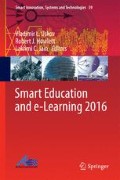Abstract
Programming exercises are time-consuming activities for many students. Therefore, most classes provide meticulous supports for students by employing teaching assistants (TAs). However, the programming behaviors of a particular student are quite different from other students’ behavior, even though they are solving the same problem. It is hard for TAs to understand the detailed features of each student’s programming behavior. We have performed data mining over the records of students’ programming behaviors in order to elicit the detailed features of each student’s programming behavior. The purpose of this study is to present the elicited such features for TAs so that they can provide effective assistances. We have performed data mining over the chronological records of the compilation and execution of individual students. As a result, we have found that there is a correlation between the programming activities and the duration time for problem solving. Based on the data mining, we have provided TAs some guidelines for each particular group of students. We have confirmed that our classifications and guidelines are reasonable through experiments over programming exercises. We have observed students who received appropriate guidance based on our data mining improved their programming performances.
Access this chapter
Tax calculation will be finalised at checkout
Purchases are for personal use only
References
Sagisaka, T., Watanabe, S.: Investigations of beginners in programming course based on learning strategies and gradual level test, and development of support-rules. J. Jpn. Soc. Inf. Syst. Edu. 26(1), 5–15 (2009). (In Japanese)
Yasuda, K., Inoue, A., Ichimura, S.: Programming education system that can share problem-solving processes between students and teaching assistants. J. Inf. Process. Soc. Jpn. 53(1), 81–89 (2012). (In Japanese)
Kato, T., Ishikawa, T.: Design and evaluation of support functions of course management systems for assessing learning conditions in programming practicums. ICALT 2012, 205–207 (2012)
Horiguchi, S., Igaki, H., Inoue, A., et al.: Progress management metrics for programming education of HTML-based learning material. J. Inf. Process. Soc. Jpn. 53(1), 61–71 (2012). (In Japanese)
Igaki, H., Saito, S., Inoue, A., et al.: Programming process visualization for supporting students in programming exercise. J. Inf. Process. Soc. Jpn. 54, 1 (2013). (In Japanese)
Ryan, C., Michael, C.L.: Debugging: from novice to expert. ACM SIGCSE Bull. 36(1), 17–21 (2004)
Alex, G., Johan, J., Bastiaan, H.: An interactive functional programming tutor. In: ITiCSE ‘12: Proceedings of the 17th. ACM, pp. 250–255 (2012)
Kurasawa, K., Suzuki, K., Iijima, M., Yokoyama, S., Miyadera, K.: Development of learning situation understanding support system for class instruction in programming exercises. Inst. Electron. Inf. Commun. Eng. Technol. Rep. ET, Edu. Eng. 104(703), 19–24 (2005). (In Japanese)
Jain, A.K., Murty, M.N., Flynn, P.J.: Data Clustering: A review. ACM Comput. Surv. 31(3), 264–323 (1999)
Kamishima, T.: A survey of recent clustering methods for data mining (part 1): try clustering! J. Jpn. Soc. Artif. Intell. 18(1), 59–65 (2003). (In Japanese)
Michael, R.A.: Cluster Analysis for Applications. Academic Press, (1973)
MacQueen, J.: Some methods for classification and analysis of multivariate observations. In: Proceedings of the Fifth Berkeley Symposium on Mathematical Statistics and Probability. California, USA. vol. 1, pp. 281–297 (1967)
Calinski, T., Harabasz, J.: A Dendrite Method for Cluster Analysis. Commun. Stat. 3, 1–27 (1974)
Acknowledgments
This work was supported by Japan Society for Promotion of Science (JSPS), with the basic research program (C) (No. 15K01094), Grant-in-Aid for Scientific Research, as well as Google MOOC Focused Research Award.
Author information
Authors and Affiliations
Corresponding author
Editor information
Editors and Affiliations
Rights and permissions
Copyright information
© 2016 Springer International Publishing Switzerland
About this paper
Cite this paper
Kato, T., Kambayashi, Y., Kodama, Y. (2016). Data Mining of Students’ Behaviors in Programming Exercises. In: Uskov, V., Howlett, R., Jain, L. (eds) Smart Education and e-Learning 2016. Smart Innovation, Systems and Technologies, vol 59. Springer, Cham. https://doi.org/10.1007/978-3-319-39690-3_11
Download citation
DOI: https://doi.org/10.1007/978-3-319-39690-3_11
Published:
Publisher Name: Springer, Cham
Print ISBN: 978-3-319-39689-7
Online ISBN: 978-3-319-39690-3
eBook Packages: EngineeringEngineering (R0)

